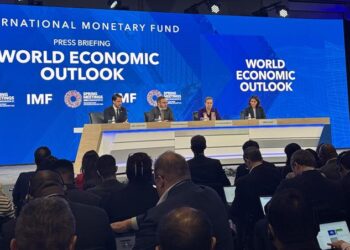The International Monetary Fund (IMF) has revealed that Nigeria’s economy is indeed recovering from the substantial trade shock that triggered the 2016 recession.
However, the IMF stressed that the country’s growth is still constrained below the level needed to reduce poverty and improved development outcomes.
According to the information contained in the 2019 IMF Staff Country Report just released and obtained by Nairametrics, persistent structural and policy challenges in Nigeria (such as large infrastructure gap, low revenue mobilisation, and high dependence on hot money) are major factors constraining growth.
The economy is recovering, but the IMF expresses concern
Non-oil sector generating little income – The IMF reported that the non-oil growth sector is picking up, however, revenue generated from non-oil revenue is still low. Also, it further stated that the Nigeria foreign exchange market is still segmented and reserves are still dependent on hot money.
Large infrastructure gap and poor governance are major problems – Similarly, the IMF noted that a combination of factors is contributing to slow growths, negative per capita growth, and weak human development outcomes in Nigeria. Essentially, these factors include large infrastructure gap and governance weaknesses.
The pace of policy reforms still falls short of the ERGP objectives
Nigeria has made effort – According to the report, the IMF acknowledged progress made by Nigeria to reform its foreign exchange market, increase external buffers, tighten monetary policy to reduce inflation, and improve the business climate.
But more effort should be made – However, the IMF stressed that the pace of reforms in Nigeria still falls short of the objectives of Economic growth and Recovery Pan (EGRP). Most affected of EGRP objectives include increasing revenue, reducing unemployment and reforming the power sector.
IMF declared growth outlook challenging and predicts 2.5% growth in 2019
In light of the the current policies, Nigeria economy would grow and hover around 2.5% in 2019, the IMF said.
The International organisation further stated that under the current policies in the medium term, a 2.5% growth implies no progress in per capita growth — as the economy continues to be hampered by insufficient policy adjustment and progress in structural reforms.
The IMF Executive Board assessment
The IMF Executive Directors stressed that despite the economic recovery accompanied by reduced inflation and rising external reserve, the medium-term outlook remains muted, with risks tilted to the downside.
Also, the directors noted that long-standing structural and policy challenges need to be tackled more decisively to reduce vulnerabilities, raise per capita growth, and bring down poverty.
Lastly, the directors urged Nigeria to redouble its reform effort and accelerate the implementation of the ERGP.
Some recommendations for the Nigerian government
The IMF put forward some set of comprehensive and coherent policy actions for the Nigeria economy. According to the organization, most of the recommendations are in line with the ERGP. These include
- Critical actions on a revenue-based fiscal consolidation while increasing social and capital spending
- Maintaining a tight monetary policy with an improved policy framework and a unified market determined the exchange rate.
- Shifting the expenditure mix towards priority areas is critical to achieving the SDGs and diversification.
- Stronger coordination is needed to increase the efficiency of public debt management and improve cash management.
- With inflation still above target, maintaining a tight monetary policy remains appropriate.
- Moving towards a unified market-based exchange rate would support diversification and inclusive growth and reduce vulnerabilities.
- Banking sector resilience should be strengthened and the framework for banking resolution enhanced.
- Supporting economic diversification and SDGs requires improved infrastructure, a better business climate, stronger governance, and addressing gender inequality.
- Efforts should continue to strengthen data quality further, by addressing remaining gaps, notably in national accounts, BOP, and fiscal statistics.




















